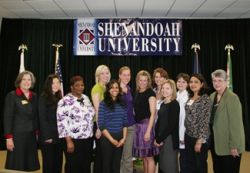Shenandoah University Prepares for Growing Spring Cohort
History, community, charity- the Division of Nursing at Shenandoah University (SU) embraces these principles and more as it prepares second degree accelerated students for an array of health care needs in a shifting society.
Since its conception in 1962, the Division of Nursing at Shenandoah University encouraged personal and professional growth as students are able to apply their studies to the communities around them.
Upon hearing about the Robert Wood Johnson Foundation’s New Careers in Nursing grantee, assistant professor Helen Mautner and her SU colleagues submitted a proposal to receive funding. With Shenandoah University’s acceptance into the program, the Division of Nursing was able to obtain ten scholarships in their first round of funding and recently received an additional fifteen scholarships to accommodate a growing spring cohort. Mautner believes the New Careers in Nursing program benefits students who apply early for their degree and encouraged applicants to stay with the process despite cost concern.
“About this time of year, we have a certain number of applicants ready to go but in August we experience about a twenty-five percent drop off at the last minute. We’ve found that the majority of students back away due to finances.”
Along with easing the burden of tuition fees, Shenandoah University’s Division of Nursing also utilizes scholarships to address the national need for a culturally diverse workforce. With heritage of West Indian and Hispanic/Caribbean, Thalia Deen is one such student who understands our country’s need for cultural competency.
“My concept of diversity has changed a lot through my involvement with New Careers in Nursing. I recently attended a ‘creative scholarship day’ session for health care professionals and got to see how much we all really depend on one another. Collaboration is so important to make sure patients get the best care and diversity plays a big role here. It’s not just about race or being a minority. It can be about the different types of professionals who are involved in patient care. That can help bring about change and improvement.”
Despite an undergraduate commitment to a business administration degree, Thalia kept health care in the back of her mind throughout her college experience.
“I became interested in health care during my junior year but it was too late to switch my degree. After I graduated, I ended up working in a doctor’s office and had the opportunity to interact with nurses. Learning what I did there and pairing it with the fact that my mother is a nurse, my interests starting shifting towards that portion of health care.”
With five years in the working world and a new found desire to serve the public’s health, Deen decided it was finally time to pursue a second degree in nursing. From the perspective of a professor, Mautner has learned that Deen’s determination and commitment is something shared throughout the nursing program.
“I love teaching in the second degree accelerated program because these are adults who know exactly what they want to do. Sometimes it makes it demanding to teach because they are very demanding but they are also focused. Many of the New Careers in Nursing students have families and have really thought about what they want to do; they are going to make excellent health care providers.”
The ten students at Shenandoah who received scholarships in the first round of funding call themselves the ‘RWJF Scholars.” They are part of a small group who were given the unique opportunity to hone in on their leadership skills, understand the needs of all communities, and find a support system that encourages growth and compassion.
Deen likes to think about the future she will have in the nursing profession.
“Once I leave Shenandoah, I plan to go back and get my Master’s. I think the New Careers in Nursing program is really pushing us.”

